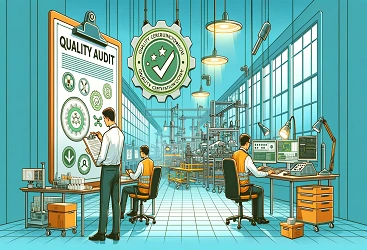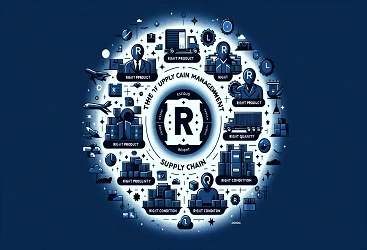What is Quality Audit?
A quality audit is a procedure in which a team of auditors, either internal or external, thoroughly examines a quality system. It is a key component ...
By AMREP | Posted on August 31, 2022
Updated on December 12, 2023

Supplier quality management plays an integral role in the success of any manufacturing plant. It also helps OEM companies to deal with production problems. Supply chain management became complex every day as manufacturers started relying on them to source raw materials and parts needed to manufacture their products. Every company must implement supplier quality management practices and procedures to achieve effective results proactively and proactively deal with production issues. Here our expert supplier quality engineers provide a brief overview of supplier quality management (SQM) benefits, best practices to follow, practical strategies, and procedures to implement.
Supplier quality management (SQM) is the process of ensuring that products and services supplied by a business meet customer expectations. It helps to ensure that all products and services are of acceptable quality and meet regulatory requirements or company standards. SQM also helps identify, prevent, and rectify any issues with suppliers as early as possible to reduce the risk of disruption or damage caused by them.
Businesses can focus on many areas within SQM, including product quality assurance, supplier performance improvement/trend analysis, supplier development/training initiatives, project management for new supply chains or expansions, warehouse operations & logistics planning, etc.
Supplier quality management (SQM) is crucial for any business that depends on external suppliers. In order to ensure the quality of your products, you need to have a system in place that monitors and evaluates supplier performance. This will help you identify problems early and correct them before they cause significant damage.
Apart from monitoring supplier performance, SQM also involves training employees who work with your suppliers on properly handling complaints and incidents. Employees should be well aware of your company's Quality Policy and Procedures so that they can respond appropriately when something goes wrong. They should also know how to document incidents accurately so that an investigation can occur as quickly as possible.
Overall, having an effective supply chain management system in place is essential for ensuring the high quality of your products – no matter what industry you're in!
SQM should be conducted throughout all stages of the supply chain - from procurement through manufacturing – in order to ensure that every stage meets specified requirements. And it should continuously be updated as new technologies emerge or practices change so that suppliers can meet customer expectations safely and effectively.
Your supplier quality management procedure and the process should include several key steps. These steps include:
It is important to remember that a sound quality management system will help you to identify problems early on so that they can be corrected before they become significant issues. Continually updating your procedures as new information or strategies emerge will also ensure that you're always up-to-date on the latest practices and best practices.
Following these simple steps can achieve high supplier quality levels while maintaining compliance with regulations or company policy.
Most of the time, suppliers are reluctant to participate actively. Managing difficult suppliers is another challenge any organization might face during manufacturing processes. You can consolidate your supply chain and stand out from competitors by implementing effective supplier quality management strategies. Here we list down the top SQM strategies that actually work.
Perform all the mentioned supplier quality management strategies to avoid production problems, and save time and headaches.
Supplier quality management (SQM) is a process that helps ensure that the products supplied meet all of the necessary requirements. By doing this, it can help to:
Supplier Quality Management (SQM) is an essential function that all businesses should implement to ensure quality control and compliance. A crucial part of SQM is supplier assessment. This involves conducting interviews with potential or current suppliers to determine their capabilities in terms of production processes, quality management systems, and delivery schedules.
Once the capability information has been collected, it should be compiled into standardized reports for use by all stakeholders involved in supplying products to your company- from senior managers down to frontline employees. This ensures that everyone is aware of what needs to be done on an ongoing basis to guarantee high standards within your supply chain and improved sales as well!
When it comes to supply chain management, ensuring that all components of the process are managed in a total quality manner is critical. Every step from procurement to delivery must be executed flawlessly for your business to maintain high customer satisfaction and growth levels.
Total quality management (TQM) is an approach to managing products and services that emphasizes continuous improvement in all aspects of organizational life. It focuses on eliminating defects, waste, and rework through complete data collection and analysis at each stage of the product or service life cycle. By doing so, TQM enables organizations to identify problems early and resolve them before they cause adverse effects downstream, such as lost time or money.
The benefits of implementing TQM into your supply chain are numerous:
If you're looking for organized ways to improve productivity throughout your entire organization while meeting consumer demands consistently, then Total Quality Management might be a good fit for you!
A supplier quality manager is responsible for ensuring that the products supplied by their company meet established standards. This includes monitoring and investigating complaints, conducting product tests and inspections, issuing corrective action plans when necessary, and maintaining records of all activities related to supplier quality management.
In addition to fulfilling these general responsibilities, a supplier quality manager may also be involved in specific work areas such as assurance testing or process improvement. As such, you must have strong writing skills and knowledge of manufacturing processes if you want to hold this position. Ideally, it would help if you also had experience working with internal and external teams to provide adequate customer service.
A good way to manage a supplier's quality is to monitor their performance regularly. This can be done through written or verbal evaluations and Bytespotter inspections. It is also essential to have clear and concise vendor management guidelines in place to quickly identify and resolve issues. Additionally, you must train your employees on proper procedures for dealing with suppliers, including documenting all interactions and reviews. Finally, make sure to establish trust between yourself and your suppliers by treating them fairly and honestly.
Regarding supply chain management, there are a few essential things you need to focus on for your business to achieve high-quality levels. These include establishing and maintaining accurate records of all materials and products that pass through your system, ensuring compliance with relevant regulations, and establishing effective communication channels between all involved parties. By following these simple tips, you can help ensure that your supply chain is functioning at its best and meeting the needs of both customers and employees.
Supplier quality management (SQM) helps companies ensure the quality of products and services supplied by suppliers or manufacturers. It involves establishing and implementing standards for delivering goods or services, monitoring performance against these standards, and taking action if necessary. SQM can help identify problems before they become significant, reduce the risk of product recalls or other incidents affecting customers, and minimize negative publicity associated with companies
But performing all these activities actively is quite challenging for the manufacturers and companies based in the United States, Europe, or Asia. Due to budget constraints and traveling issues, it becomes expensive, and they can not keep a constant eye on suppliers in Mexico, China, Japan, and other countries
An effective way to ensure the quality of overseas suppliers or manufacturers is to take the services from third-party supplier quality management companies offering on-ground solutions. AMREP is one of those supplier management companies having a team of supplier quality engineers, production managers, and procurement experts with years of experience in production and supply chain management. Partner with our team for supplier quality management services to power your production line.
Contact Us To See What We Can Do
Call Us
Mon - Sat 9.00 - 18.00
Sunday Closed


21 - September 2023
21
September
2023
A quality audit is a procedure in which a team of auditors, either internal or external, thoroughly examines a quality system. It is a key component ...

14 - October 2022
14
October
2022
Supply chain management (SCM) is the process of planning, measuring, and monitoring the flow of goods and services from the suppliers to the end customer...

19 - March 2022
19
March
2022
AMREP Supplier Management Services is back again working in the Defense Electronics industry. Previously our work was on night vision ...
